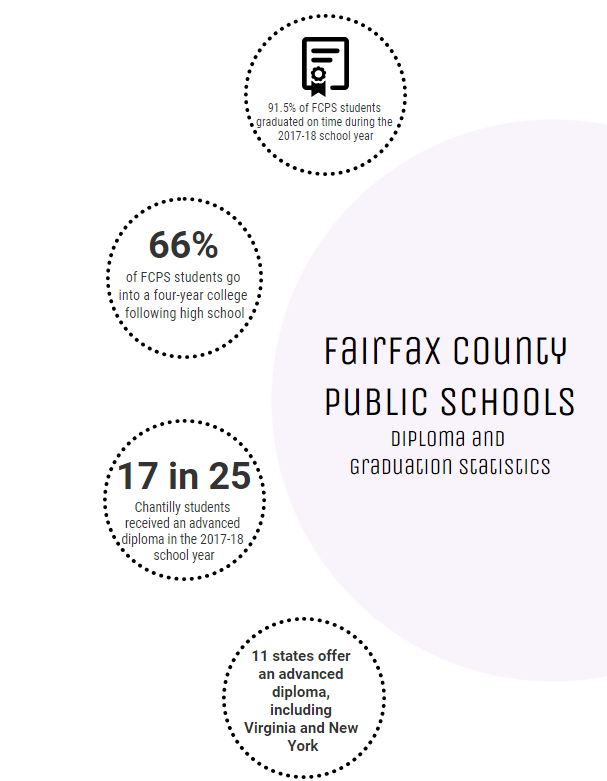Advanced or Standard Diploma?
source: Virginia Department of Education
March 25, 2019
Starting in January, students meet with their assigned counselors to talk about their plans for the upcoming school year. These plans include conversation about the quickly-approaching graduation, and what type of diploma they’re aiming for. In terms of diplomas, two options are presented: standard and advanced. The difference between an advanced diploma and a standard diploma lies in the class requirements. Students who choose to obtain an advanced diploma must take four years of math and science and three additional electives. In addition, students who opt for an advanced diploma must earn nine verified credits in comparison to six.
“[With an] advanced diploma, you must earn three language credits as opposed to one or none,” Subschool 2 Counselor Shara Carter said. “There are more math and science credits to earn.”
Math credits include taking a math (or a math elective) course all four years. With sciences, you would be required to continue taking science classes following completion of physics or geosystems. Many students view having an advanced diploma as the only right way to graduate high school or the way to present themselves as competitive applicants to colleges. Students who are debating which diploma is best suited for them often consider their plans after high school.
“Out-of-state colleges don’t really know what an advanced diploma is,” senior Kelly Harmeston said. “I’d rather take classes now that interest me and [that I] find more fulfilling than take classes to fulfill a diploma requirement.”
From a counselor’s perspective, advanced diplomas are meant to create a more appealing application for students applying to college.
“With the advanced diploma, you are taking more core academic classes and more language, which appeals to more colleges,” Carter said. “It truly is a personal preference. An advanced diploma is not necessary to go to college.”
Virginia is just one of eleven states that offer an advanced diploma; this means that if a student is applying to colleges out of state, it may be beneficial to focus on classes that they’re interested in and subjects they want to pursue later in life.
“Colleges aren’t going to look at whether or not you have an advanced diploma; they are more looking at the classes you take,” Harmeston said. “Focus more on the classes instead of the kind of diploma you’re getting.”
For those in the process of getting an advanced diploma, making sure to be mentally cognizant and aware of the classes that they take, and the work involved with them, may be an important and critical factor to their four-year experience.
“Know your limits. Know whether or not you can handle an advanced diploma,” senior Emily Bacha-Camacho said. “Everyone wants to be better than their peers and have a nicer diploma, but if you know that you probably won’t do well in the classes that are necessary for an advanced diploma, then don’t put yourself through that all four years.”
Because many students aim for the advanced diploma to be a more attractive college applicant, some students feel as if they are competing against each other in terms of high school and beyond.
“[The advanced diploma is] more about putting students against one another than pushing individuals to do their best,” Harmeston said. “It becomes more about the diploma than what you’re interested in and what you want to pursue.”
Before comparing themselves to the kid sitting next to them, students can consult with those who will help steer them in the right direction to make the best choice for them.
“Talk to your counselor. [They] can hear what your goals are, how you’re doing in your present class load [and] how you’re managing your after-school activities and other stresses in your life,” Carter said. “There are many aspects that go into deciding something like what type of diploma is important to you.”


